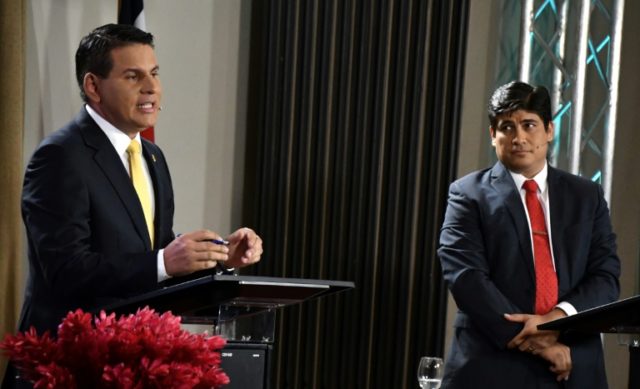San José (AFP) – Costa Rica votes Sunday in a presidential election that will see either an ultra-conservative evangelical preacher or an ex-minister from the ruling center-left party become head of state.
The choice has divided the small Central American nation of five million people, pitting those who hold dear social conservatism and strong religious faith against others proud of the country’s strong record on human rights and tolerance.
The two candidates in the run-off election share several points in common: both have backgrounds as journalists, both are singers — and both share the same last name, though they are not related.
But they represent very different brands of politics and personal style.
Fabricio Alvarado, the preacher, surged from nowhere in the first round of the election held in February, triumphing over a field of 13 candidates by fiercely criticizing gay marriage.
The right-wing 43-year-old, a former TV reporter, has the fire and charisma of someone used to the pulpit.
Carlos Alvarado, in contrast, is as restrained as he was when he served as labor minister. The 38-year-old’s platform is broader and seeks continuity with the outgoing government on tackling the public deficit and boosting education.
In the first round, Fabricio Alvarado won 25 percent of the ballots against 22 percent for Carlos Alvarado — both well short of the 40 percent required to avoid a run-off.
– Easter effect? –
“Both candidates are unknown for us,” said Ricardo Montoya, a 41-year-old bus driver.
But he hinted that he and like-minded voters were tilting towards Fabricio Alvarado.
“We are thinking of someone new, someone who is a person of the people, who does his shopping in the supermarket, who knows how much a liter of gas costs,” he said.
Gustavo Araya, a political analyst from the Latin American Social Sciences Institute, said: “This is the first time that an election in Costa Rica has become polarized between religious issues and human rights.”
Some 3.3 million voters were being called to decide the poll. Pre-election surveys suggested a neck-and-neck race: Fabricio Alvarado was credited with 43 percent support against 42 percent for Carlos Alvarado.
An accident of the calendar could lend a small lift to the evangelical’s result: the election falls on Easter Sunday, at the end of a four-day holiday weekend.
Many affluent Costa Ricans would be returning from beach or family getaways on that day, perhaps thinning support for Carlos Alvarado, whose base is in the better educated classes in cities and towns.
Fabricio Alvarado counts more — but not exclusively — on rural folk who have shown themselves more receptive to the Pentecostal evangelical churches that have proliferated across Latin America in recent decades.
– ‘Deterioration’ of democracy –
“This election is one more symptom of the gradual deterioration of Costa Rican democracy” in which disgruntled citizens were rejecting “a political system perceived as corrupt and distant,” Kevin Casas, an expert on rule of law at the Dialogue think-tank in the United States, wrote in a piece for the Spanish version of The New York Times.
He said Fabricio Alvarado’s ascent was a sign of growing political disenchantment across Latin America — “a situation of loss of credibility for the traditional political elite.”
That pessimistic take challenges outsiders’ usual view of Costa Rica as a tourist paradise boasting high levels of education, eco-friendly policies and relatively low levels of violent crime compared to other Central American countries.
But visitors tempted to its sandy beaches and volcanic nature preserves rarely encounter the deep-rooted conservatism shading much of Costa Rican society, or the religious influence still held by the Catholic Church or the growing evangelical movement.

COMMENTS
Please let us know if you're having issues with commenting.